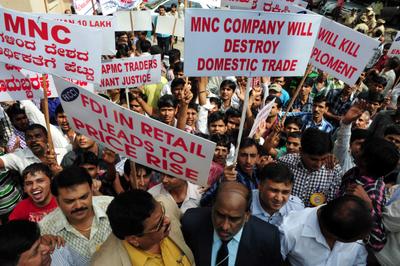Prime Minister Manmohan Singh, after taking charge of the Ministry of Finance, indicated that the onus is on the government to revive the ‘animal spirits in the country’s economy’. As a result, investors are hopeful among other things of a favourable decision regarding FDI in the multi-brand retail sector that will presumably create millions of jobs, help check inflation and modernise the agriculture sector, which in turn will liberate millions of hapless farmers and poor consumers from the hold of the middlemen and petty retailers.
But supporters of FDI in this sector are wrongly using arguments based on comparative statics and total welfare to counter concerns about the dynamics of adjustment and the distributional impact of the proposed policy change. In fact, as discussed elsewhere, the costs of adjustment are unlikely be distributed randomly and relatively vulnerable sections are likely to be net losers. The proposed policy change is also unlikely to tame the sticky problem of inflation and is not necessary for modernising the agriculture sector.
An inefficient supply chain in agriculture is largely driving India’s food price inflation, which can be controlled by creating an efficient ‘farm-to-fork infrastructure’. But it is not clear why foreign capital, technology and managerial expertise are indispensable.
Let us consider the need for foreign capital. The government continues to pour billions of dollars into leaky buckets, such as the Food Corporation of India and the public distribution system, without tackling mismanagement and corruption. If a fraction of these funds were properly invested in building a good quality supply chain, then FDI would not be desperately needed. Critics could argue that India does not have the relevant technology; but finding better ways of storing and transporting crops is not really difficult. Also, the potential of transferring of managerial technology from multinational retailers to their Indian partners and competitors cannot be overvalued. Learning from their experience in India might be as difficult as learning from their experience in other countries.
More importantly, the White Revolution that radically transformed India’s dairy industry demonstrated that Indian capital, technology and managers can do everything foreign companies can do without generating as many distributional problems.
But can FDI help achieve certain policy objectives such as inflation control? Perhaps not. On the one hand, it is argued that FDI will not harm unorganised retailers because the organised sector’s share will remain small in the foreseeable future. On the other, it is also argued that the impact of this small share will be so significant that it will restrain inflation in the economy in the short term. The two claims do not add up.
Let’s assume that FDI can indeed help achieve policy objectives. What about the costs of adjusting to the regime change from retail democracy to a new arrangement? It is argued that India has no reason to be apprehensive because such changes have been successful in countries like Argentina, Brazil, Chile, China, Indonesia, Malaysia, Russia, Singapore and Thailand. But when these countries allowed FDI, they were either already middle-income countries; had a relatively small part of their population engaged in retail trade and agriculture; were in the midst of a serious crisis; or were not ‘noisy’ democracies. On the other hand, India is still a largely poor country, where unorganised agriculture and the retail trade continue to be the largest employers and absorb the bulk of the unemployed youth. And more than anything else, India is a functioning democracy that is not facing a debilitating crisis. In this context, any attempt to introduce a policy without addressing the concerns of the vulnerable will eat into the vitality of the democracy by promoting distrust of the political system.
To conclude, distributional concerns regarding the proposed policy change remain unanswered, and it is unclear if the change is indispensable for achieving legitimate policy objectives like inflation control and the modernisation of agriculture and the agricultural supply chain. So, FDI in the multi-brand retail sector is not a panacea for India’s economic woes. Pushed into the corner, supporters would like to defend themselves by claiming that allowing FDI in multi-brand retail is, in fact, just a signal to international investors, who have suddenly grown wary of India. But isn’t risking the livelihoods of hundreds of millions to revive elusive ‘animal spirits’ irresponsible?
Vikas Kumar is Assistant Professor of Economics at Azim Premji University, Bangalore.

